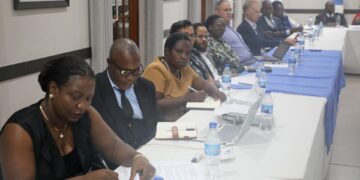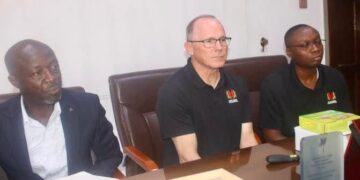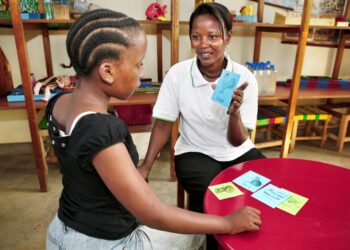That’s nice. But that must have been a tough period for you. When you discovered, how were you and your husband able to come to terms with it and were you even aware of autism before this point?
We were not aware of autism. It was when we got the diagnosis that we heard the term autism for the first time And then we started to do our research. And me being very practical, I always hit the ground running. So, I kind of just jumped into it and I started to build my wings as I went along. My husband was actually very supportive and being someone that is very quiet and a bit of an introvert as well, he was able to internalize a lot of these things. And then when we decided to set up the center, he was the one that actually wrote the proposal for the center. He gave it his all and put everything and thankfully we were able to get the support to set up the center. For me, I would say I’m blessed, because for so many people, the story is not the same. Many husbands just say, “no, it’s not from my part of the family”. We never had that argument about where it came from or anything like that. We just kind of embraced it. I think it’s because God had a plan for the centre. That’s what gave both of us the impetus to be on the same page concerning Agbolade. We were always on the same page. There was never a time when we struggled with the things that concerned him. We were always on the same page and that really helped us. Yes, that really helped.
Excellent. So, how’s your son now? I guess what I really want to ask is, does autism affect people’s chances of succeeding academically and doing well in life?
Well, I would say autism can affect the academics of people that struggle with it.
So it really depends on where you are on the spectrum. Remember I said earlier that’s it’s a spectrum. There are those that are on the mild, some are moderate, and others are severe. So those that are on mild part of it and have had some form of therapy – don’t get me wrong, without therapy, you can move from mild to severe – can do well academically. So, you have to be on some form of therapy. Some friends say, oh, I never used therapy. Ask them what they did with the child in the home environment. That is therapy for that child. So, for those on the mild, they can go on to function in life, do what they need to do and get their academics. In fact, we have some of them that are high flyers and are next to geniuses in their places of interest, just like our son. Our son is a mathematician. He made a first class in Maths. He’s currently doing his PhD in mathematics. So, that’s what he knows, that’s what he enjoys, that’s what he loves to do. So, it’s like paying him for what he loves to do. At the end of the day, it depends on how affected the individual is, the approach the family take at the foundational stage, the interest that they build in that child and the exposure that that child has at every point in time.
So, I have a young man that came to us at the age of four, no speech. He didn’t come to us fully because he was only at the mild end and was still attending mainstream school. He didn’t have speech. And then two years down the line, he started to speak. Today he speaks three languages. He speaks Dutch, he speaks German, he speaks English. So you see, it depends. The parents took that approach of we will make sure you get the best of therapy but they had to first of all be embracing and accepting. Many people don’t accept it. Some, overwhelmed by it all, take advice from friends or family members who suggest the medication approach but that only complicates things. We now see the child drowning in medication and we can no longer see the real child. So, it depends on the approach that the family takes and the amount of time dedicated to that young person. And for some, the parents can have the best approach, yet, the child falls on the severe end. Unfortunately, in such cases there is little one can do. The only thing that one can do is to find out what that child loves and enjoys and can do on his or her own. You amplify it, you build on it, you strengthen it, and allow that child to be independent of others. That way, at least, he or she has a life. So, that is what we call allowing the child to reach his or her full potential.
What sort of assistance or interventions, if any, can be offered to help someone who is autistic?
It depends. Like I said earlier, they are affected differently. Some are affected with sensory dysfunction, some with behaviour, some with many things. Most are affected in communication and social skills. So, once you know the area of need, the child needs to be exposed to speech therapy and occupational therapy that would help with self help skills; things that the child needs to be able to do independently – to be able to bathe, brush, tie shoelaces, wear clothes by himself and so on. And also the occupational therapist can help with sensory dysfunction by helping the child modulate his sensory needs. So you give what you call the sensory diet. Sensory diet is not food. It’s a set of activities that help that individual to either modulate it to the right level by amplifying it or bring it down to the right level. So what we’re looking for is an equilibrium where the child can function in his own capacity as an individual. Then you have behavioural modification. If there are any behavioural issues that have to do with the child behaving in a certain manner. And behaviour is like an iceberg. At the tip, you see the behaviour, but underneath there are many issues that are related that brings out that behaviour. So for instance, if the child is not communicating, he’s not using language at any point in time and has a lot of sensory needs, it will show in his behaviour. So, you will see unusual behaviour when those two areas are affected or social skills are affected or the environment is affected or the child’s nutritional aspect is affected. Because diet too has a lot to do with it. Yes, many times. Because the children don’t speak, they have different needs, biological needs that they are not able to tell us. And if we don’t address that, we will also see that in their behaviour. We see that in hyperactivity. For instance, if we feed them with too much sugar, we see them bouncing off the walls. If we feed them with too much additives or too much processed foods, we see that in their behaviour too. So you have to be careful what you feed them because a lot of times they cannot communicate their needs to you. You have to keep guessing that this is what is going on. So you would want to eliminate nutritional challenges early by giving the right food and making sure that you are giving them natural foods that their system can digest. Because some of them have what we call the leaky gut and that has to do with the type of food that they eat that causes their guts to have holes. And then sometimes the undigested food from the leaky gut flows into the bloodstream and goes into the brain like an opium. And that’s when you sometimes find them spaced out. That’s when they look from the corner of their eyes – they like to see two dimensional things, three dimensional things – some of them turn themselves upside down and try to see things from another angle. Once you start seeing such behaviour, you would have to look at the biology of the child to make sure that the child has the right nutrients. Some of our children have too much sugar in their bloodstream and because they don’t get tested a lot of the time, we would never know.
Have governments, federal or state, been supportive of your cause in any way?
Yes, the federal government and Lagos state government assist once in a while so I wouldn’t say no. We’ve had support from SUBEB which came from the federal government at some point. They helped us build a borehole and they helped us build one of the buildings at the back. So, they come in from time to time, but it’s not enough. The last time we heard from any government was over four years ago. I mean, we keep writing to let them know that we’re still here. We keep them abreast of our activities, so they know that at least there’s somewhere called Patrick’s that’s doing something that they should be doing. What we would really love is for them to have some form of support for families in terms of maybe grants to help educate the children and also to do capacity building for both the parents and the teachers in the public schools. So, even those that struggle financially to come to us can thrive in the public school environment. So, yes, they are not doing enough; not nearly enough, if you ask me. Because parents still have to pay to come here. And how many people can we take on scholarship? Right now we have about 50 children and between 13 and 15 of them are on scholarship. And maybe another 6 or 7 are on part payment. So that’s how we’ve been running the centre, thankfully successfully for the past 17 years.
In the Nigerian culture, it is quite common for parents who have children who are different to live in denial, perhaps because of the fear of being stigmatized. How do you convince those who come to you to accept that their child is autistic?
I mean, the fact that they come to me is the first acceptance that their child has something that they worry about. So for us, that is not the main problem. The main problem is those that we have to go and preach to and tell that something is wrong with their child. So, what we do is that we have something we call therapy outreach. It’s a community outreach programme that we take to different areas of Lagos. We go into that community to talk about what autism is and encourage the parents to bring their children. So, once we go and talk about it, we create a three day program where parents can bring their children to us, and then we encourage them and teach them what they need to do with their children and get them to do it in their home environment. We find that it’s often easier for those that are not affluent to talk about it. Those that are affluent are the ones that don’t talk about their children on the spectrum because of stigma. And then when you say stigma, what is stigma? We are the ones that bring the stigma on a lot of times, by not speaking out. I mean, if we keep talking about it for a very long time, many people will know what it is and will want to find a way to support their children. But certainly, stigma is real. So, many times you still have to explain it to the people when they ask why one’s child isn’t talking. But I encourage parents to see it as an opportunity to educate that person about what autism is. Because autism has no facial presentation, many people don’t understand it. They still see it as a spiritual attack.
Last but not least. Are there any individuals or organizations that you would like to single out as major pillars of support to you and your autism cause. Especially at the beginning when most Nigerians had never heard of autism and most of those who had, didn’t know what it was?
Okay, I must first single out GTBank. It is because of GTBank that I was able to set this centre up successfully. The late Managing Director, Tayo Aderinokun of Blessed Memory was our first support to bring this vision to reality. And then of course with GTBank over time, we have been involved in a lot of things that they have created in autism awareness. The GTBank Autism Conference, the Autism Consultation. Then we have other organizations like Grooming People for Better Livelihood Centre who have supported us in terms of providing scholarships for children. Every year we get scholarships from them. And then we have other organisations like Lakowe Lakes that have supported us also, especially with the building at the back. We have Bridge House School that has also supported us in that regard. And then we have a group of journalists that come together, the Nigeria Institute of Public Relations, who come here every year to give to us. We even had a Woman prayer group who were of help to us. So, we have people that come to us from time to time, various organizations that support us in our cause to make this a success. And then we have individuals also, many of whom would not like to be named. We have reasons to be thankful for the support we have received, closing in on two decades now.



















































































 EduTimes Africa, a product of Education Times Africa, is a magazine publication that aims to lend its support to close the yawning gap in Africa's educational development.
EduTimes Africa, a product of Education Times Africa, is a magazine publication that aims to lend its support to close the yawning gap in Africa's educational development.